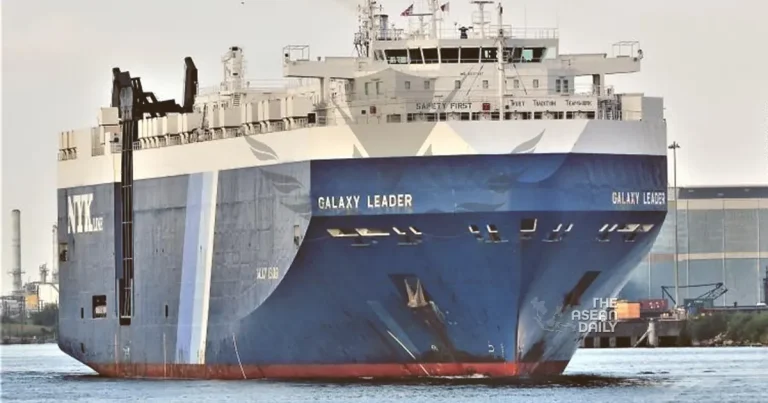12-1-2024 (SINGAPORE) A recent foiled attack on a Singapore-linked tanker has turned focus to the growing threat posed by Yemen’s Houthis to critical global shipping lanes through the Red Sea. But beyond beefed-up naval patrols, resolving the root conflicts enabling the rebel militia’s dangerous provocations remains key to securing this economically vital waterway.
The unsuccessful January 8 strike saw a remotely piloted bomb-boat target the M/T Pacific Zircon anchored off Yemen’s coast. The innovative drone attack represented a worrying escalation, albeit one thwarted by the ship’s alert crew.
Still, the brazen attempt underscored the Houthis’ expanding maritime strike capabilities through cheap, disposable unmanned weapons. This allows the militia to threaten international vessels from afar with minimal risk.
The Red Sea’s critical importance magnifies such dangers. The waterway links Europe, Africa and Asia, carrying about 10% of global trade. Major commercial shipping routes transit through en route to the Suez Canal, while millions of barrels of oil daily pass nearby Yemen.
Any turmoil threatening free passage through the Red Sea risks severing the lifeline of global commerce. Besides economic catastrophes, shipping disruptions could starve populations reliant on critical imports. Developing states like Eritrea and Djibouti would suffer deeply if maritime links shrivel.
The Houthis likely realize their attacks’ disproportionate impact and seek to leverage these stakes for political gain. Their Iran-backed militia has lost little time attacking ships of key Saudi coalition partners like the UAE and Saudi Arabia itself, hoping to fracture the alliance against them.
Countering the rebel movement’s maritime capabilities is thus an international obligation, not just a localized conflict. Coalition naval forces have intercepted Houthi attacks before, and Australia announced expanded patrols after the latest incident. But the vast Red Sea makes patrolling every vulnerable vessel near impossible.
Technology like armed drone boats also enables the Houthis to strike far from Yemen’s shores. And options to deter extremists ready to die remain limited. While essential, purely military responses can only mitigate, not solve, the threat.
More enduring progress requires a honest examination of what enabled the Houthis’ dangerous provocations in the first place. Their rise was fueled by political marginalization of Yemen’s Zaidi Shiites and the violent aftermath of Saudi intervention against them.
Seven years of war have rendered governance non-existent, leaving extremists to exploit the chaos. The Saudi-led coalition is not blameless either – its devastating blockade helped radicalize embittered civilians into Houthi recruits.
Of course, none of these factors absolve the militia’s terrorist bombings and maritime strikes targeting civilians, like the fatal attacks on Abu Dhabi last year. They remain an illegitimate, Iranian-sponsored rebel force that must respect international rules.
But Syria’s tragedy illustrated that military crushing extremists absent political solutions typically backfires. An isolated community will only turn to radicals for empowerment. Negotiated settlements addressing local grievances offer smarter remedies.
With UN-led talks stalled, Yemen’s conflict endures in a bloody stalemate. This enables the Houthis space to menace Red Sea shipping lanes while fighting rages inland. Renewed diplomatic urgency is vital to stop Yemen becoming another endless quagmire defined by extremism.
Saudi Arabia must also recognize that its devastating air war has turned Yemenis against the coalition as much as the Houthis, enabling the militia’s recruiting. A more calibrated role for the Saudis as neutral peace guarantors could foster breakthroughs.
Securing the Red Sea ultimately requires clinching an inclusive peace deal that brings tangible improvements for Yemenis to regain hope. Depoliticizing aid access also remains crucial – the Houthis weaponize suffering by blaming coalition blockades. Allowing impartial relief defuses propaganda.
Combating maritime threats like the Houthis requires allies like Singapore assisting coalition patrols to protect free commerce through the Red Sea. But larger challenges loom onshore in resolving the tensions that birthed Yemen’s turmoil.
Through UN leadership, the region must rally anew behind a peace process that silences guns and hate. Otherwise, extremists will only exploit lingering despair to further imperil the Red Sea’s stability.
With global supply chains at stake, securing this maritime crossroads demands addressing causes, not just symptoms. Ending the lifeline’s chokehold means rekindling Yemen’s hopes beyond conflict.




